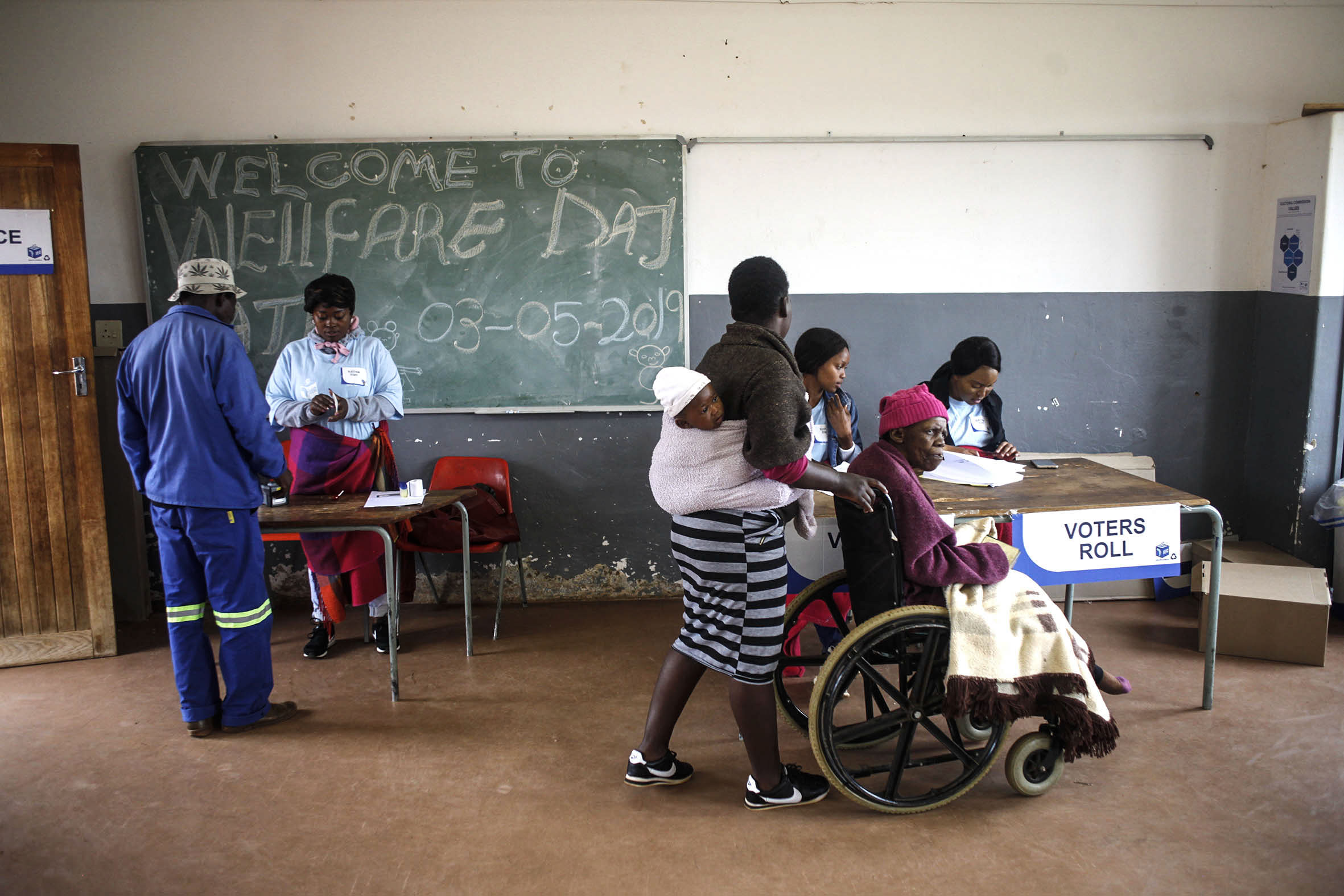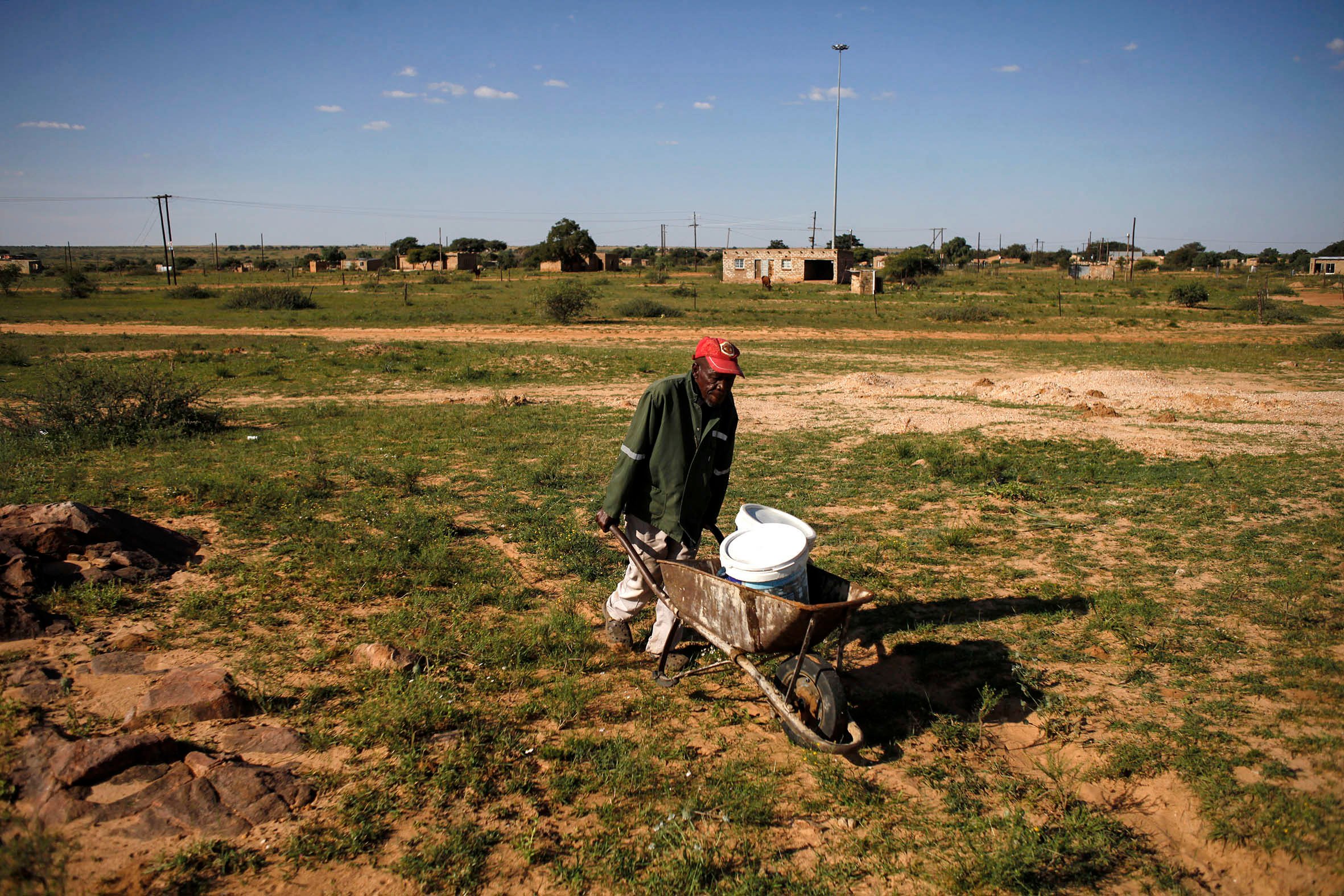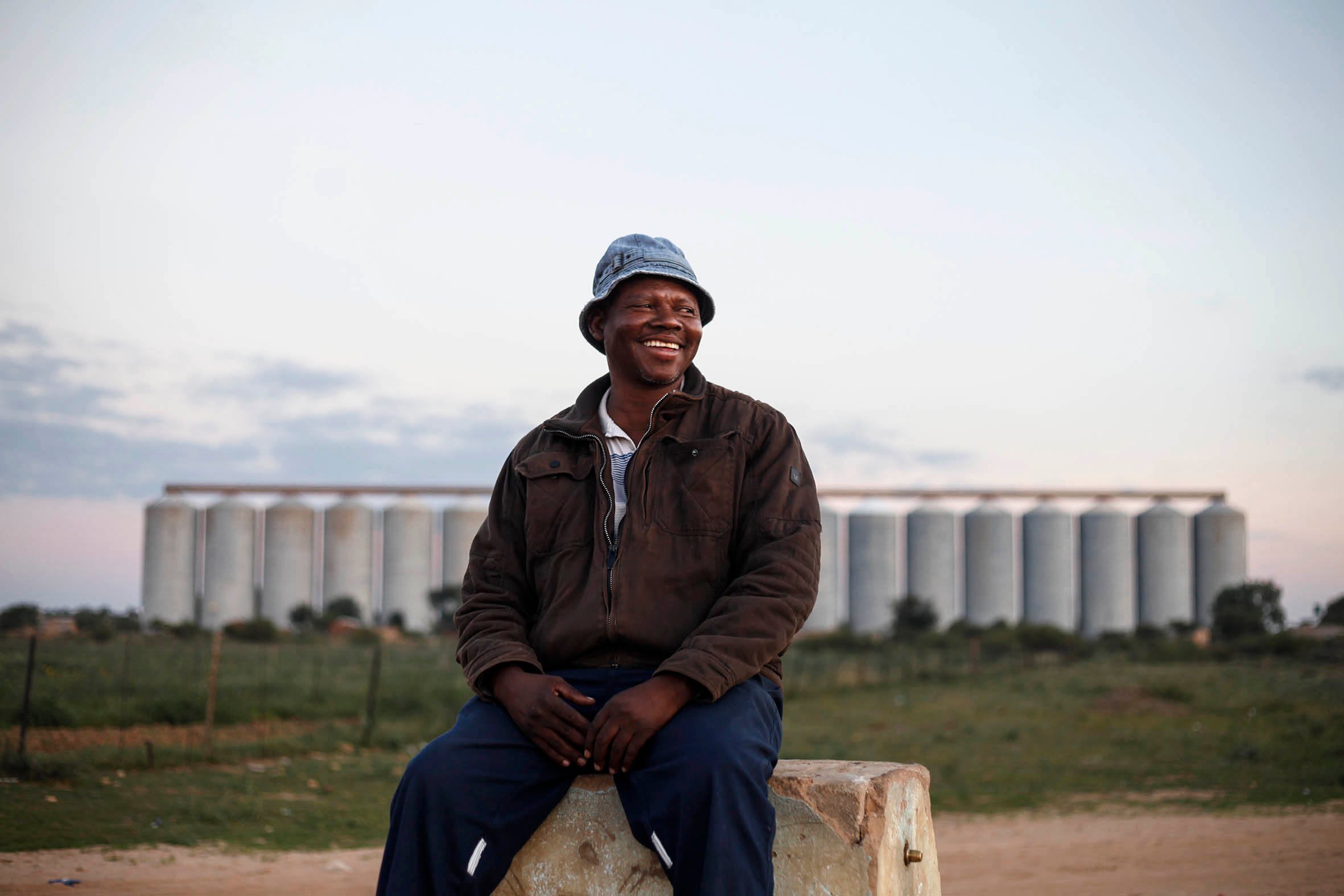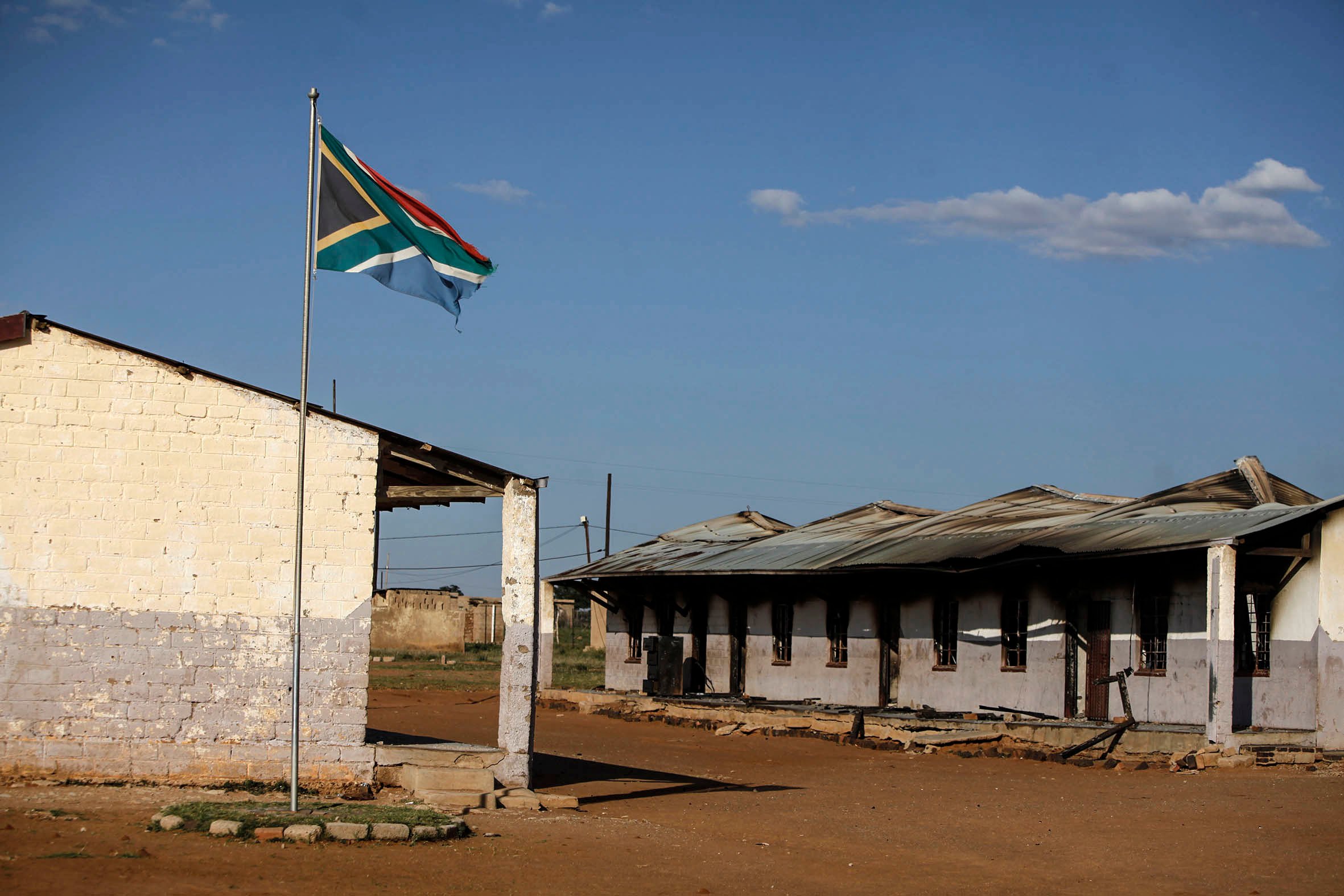Kraaipan, south of Mahikeng in the North West. (Oupa Nkosi/M&G)
The sun is setting on the last day before the elections. Pushing his wheelbarrow,and its cargo of two 20-litre buckets of water, 63-year-old Stoki Mokoena makes regular stops to catch his breath. It’s a 2km walk from his house to the nearest communal tap in the village of Kraaipan, south of Mahikeng in the North West.
Like much of the rest of the province, Kraaipan and its parent Ngaka Modiri Molema district municipality do not have much in the way of working services. The municipality has been under administration and out of administration, but residents say little has changed.
Last Friday, members of the community burntdown the school where polling was meant to take place this week. Some 5000 police officers were deployed to the province over concerns of similar incidents occurring, as this is a province where anger has often turned to action.
 Sad scenes: Wheelchair user Violet Seagisho is assisted by her daughter, Kelebogile, to vote at Letsaba Primary School in Kraaipan. (Oupa Nkosi/M&G)
Sad scenes: Wheelchair user Violet Seagisho is assisted by her daughter, Kelebogile, to vote at Letsaba Primary School in Kraaipan. (Oupa Nkosi/M&G)
Mokoena lives in a two-bedroomed flat. The foundation of an RDP house —dug earlier this year but left unfinished —takes up one end of his yard. Some RDP houses are scattered around the village, but most of the homes are made of mud. Mokoena does not have a toilet, so he has to use his neighbour’spit toilet.
“Life is hard here, ausi,” he says, talking about his daily 2km trip to fetch water. “All I want is to have a tap in my yard. But maybe I will be dead by the time they install a tap in my yard.”
 Stoki Mokoena collects water from a neighbour’s home that is situated about 2km away from his home. (Oupa Nkosi/M&G)
Stoki Mokoena collects water from a neighbour’s home that is situated about 2km away from his home. (Oupa Nkosi/M&G)
According to Statistics South Africa and the 2011 census, just 22% of people in the district have access to water inside their yards, and 31% have piped water in their homes. And access doesn’t mean the water is always flowing. The rest — 47% of people —have to travel, like Mokoena, to find water.
Mokoena arrives at the New Kraaipan community hall at 7:38am to cast his vote on election day. At 7:41am he is out and making his way home. “I have been voting since 1994, but I have not seen any progress in this village. But we will vote so that politicians continue to be rich while we suffer. Re tla reng ausi?”
Some 6km away, a blue and yellow independent electoral commission voting tent stands next to the scorched walls of Tlhakajeng Primary School.
Nthabiseng Sibinda (38), who worked at the school as a cook, tells the Mail &Guardian that members of the community arrived at about 10am on Friday and instructed teachers and learners to leave the classrooms. The angry crowd trashed everything and poured paraffin on the building before torching it.
“Children were so terrified that some did not even get the chance to take their schools bags and they burnt with the school,” she says.
Now, two police officers stand idly near the tent. Inside, IEC officials wait, idle, with no voters in sight for long stretches of time.
Moses Kgositsile (52) tells the M&G that the community built the school. His mother, born in 1901, told him that when she was born the school was already standing. Back then, it only had three classrooms. In the 1970s and 1980s more were added. “It’s an old school. There were cracks inside some of the classrooms,so it could have collapsed any minute and injured the children,” he says.
Kgositsile says the community has been waiting since 2014 for promised renovations to make it safe. Although he doesn’t condone its torching, he says he understands the frustration of the residents, especially from young people, who are more militant and have grown tired of “empty promises” by the state.
Children haven’t gone to school this week — Kgositsile says they are waiting for mobile classrooms to be brought in.
“People in government make promises that they don’t deliver. Even this school can go for 20 years before it’s rebuilt. You will shake my hand when you come here next time and still find it like this.”
Education isn’t the only place where people say government has failed.
For 25-year-old Kelebogile Seagisho — who helps her 65-year-old wheelchair-bound mother, Violet, to vote at Letsaba Primary School —the healthcare system is also failing. Her mother has a mental illness but hasn’t got the medication she needs to stabilise it.
“Every time I go to the clinic to get her pills, they say they do not have them. I also wish that she could get a better wheelchair,” she says.
The Kraaipan clinic is the only clinic in the village and it has to service about 9000 people.
Without adequate healthcare, people have to buy their own medicine. That’s a problem in an area where jobs are so scarce. Tsholofelo Mookisi (29) says only a handful of young people are employed in Kraaipan. She worked for five years in Gauteng as a cleaner until her contract ended. Since then, she has been without a job.
“It’s so disheartening. We are just stuck with nothing to do.” Stats SA data records the unemployment rate at 36% in the district, and 47% for those under 34.
Ben Matseyabangwe says there was work in Kraaipan under the Bophuthatswana regime, a bantustan set up during apartheid. He points at maize silos that he says have become dormant since the “new dispensation”.
“That’s where many people were employed. There was also a rail
line, and people would transport maize all over. But that has stopped,” he says, throwing his hands in the air.
“Now few people work around here. Those who work are employed in Rustenburg, Jo’burg or Mahikeng, and even there they work at these small shops owned by foreign nationals. It’s not real jobs,” he says.
 Behind former police officer Ben Matseyabangwe are Kraaipan’s maize silos, which he says have remained out of use since 1994. (Oupa Nkosi/M&G)
Behind former police officer Ben Matseyabangwe are Kraaipan’s maize silos, which he says have remained out of use since 1994. (Oupa Nkosi/M&G)
With young people forced to leave Kraaipan to find work, election day is dominated by older voters. Many arrive on donkey carts —a standard mode of public transport in the area. Batlhalefeng Kgosietsile (80) arrives wearing a black refuse bag to protect her from the pouring rain.
She says she has been voting for the same party since 1994 and although she is dissatisfied by the lack of water and poor roads, she is happy that she gets her old-age grant.
“I’m near my death now. There is nothing more I can do to influence change,” she says.
First-time voter Lesego Masupane (21 )believes her vote will bring change to the community, especially for young people. For her, education and high schools are critical —there is only one high school in the area.
 Tlhakajeng Primary School was allegedly burned down last week by fed-up community members, who say they have waited since 2014 for promised renovations to make the school safe. (Oupa Nkosi/M&G)
Tlhakajeng Primary School was allegedly burned down last week by fed-up community members, who say they have waited since 2014 for promised renovations to make the school safe. (Oupa Nkosi/M&G)
Data from Stats SA shows that just 26% of people over the age of 20 have completed matric. There are also all sorts of barriers to getting a job, even if you have finished school. “For example, when I go to the community ICT centre to print a CV, I’m required to pay R5. What is that? It’s wrong.”
But services require money. Kraaipan falls under the troubled district municipality. It was placed under administration — again — last year, after rolling unrest across the North West led to the ousting of then premier Supra Mahumapelo.
Seven other municipalities were also placed under administration. The auditor-general found R828-million in irregular expenditure at the Ngaka Modiri Molema district municipality.